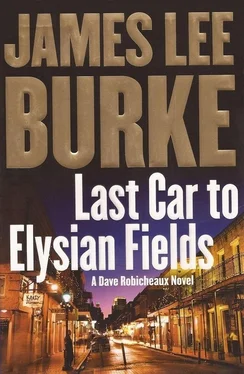“Our man Max?”
“What’s with this guy?”
“He’s nuts.”
“That’s the best you can do?”
“Got a better explanation? Where’d he go?”
“They don’t know. They think he was driving a rental.”
“He’ll be back.”
“You sound almost happy.”
“He saved my life. Maybe he has redeeming qualities,” I said, grinning at her.
“The guy who said ‘suck on this’ and blew away two people?”
“It’s only rock’n’roll,” I said.
“Fire your psychiatrist,” she said, and closed the door.
I studied the names and lines on my notepad. Years ago, after the murder of my wife Annie, I went twice a week to sessions with an analytically oriented therapist in Lafayette. He was one of those who believed most aberrations in behavior and personality development were caused by fairly obvious dysfunctions in the patient’s environment. The problem in treating them, he maintained, was that they were so obvious the patient usually would not buy the connection between the cause and the problem.
Theodosha had told me her husband, Merchie, was having what she called another flop in the hay and that she couldn’t blame him for it. I took that to mean she had a sexual problem of her own, one that had sent her husband elsewhere. But I also remembered a remark our dispatcher Wally had made about Merchie Flannigan, as well as one made by Clete Purcel.
I walked up front and leaned on the half-door that enclosed Wally in the dispatcher’s cage. He was writing on a clipboard, the top of his head and his neatly parted, little-boy haircut bent down. His shirt pocket was stuffed with cellophane-wrapped cigars. “Whatchu want, Dave?” he asked without looking up.
“You told me Merchie Flannigan was a bum, that he was a guy you never liked. Let’s clear that up,” I said.
“So I got a big mout’,” he replied.
“This is part of a murder investigation, Wally. I’m not going to ask you again.”
“He’s got a wife, but he messes around on the side.”
“A lot of men do.”
“He was driving my wife’s niece home. She was working at his office in Lafayette. She was seventeen years old at the time. He axed her if she wanted to go swimming at his club. It was late and the club was closed, but he said it didn’t matter ‘cause he had a key and the owner and him was golf buddies. She didn’t have a suit, but he said that wasn’t no problem ‘cause they’d get one from behind the counter and put it on his tab.
“There wasn’t no lights on in the pool when she came out of the dressing room. She started swimming back and fort’ across the shallow end, then he come up to her and axed her if she could swim on her back. She said she always got water up her nose, and he says just turn over and rest on my hands and I’ll show you how to do it.”
I waited for him to go on but he didn’t.
“What happened?” I said.
“He tole her how pretty she was, how she had to be careful about young boys only got one thing on their mind. She tole him she was cold and she better go back inside and get dressed. He said it was okay, they’d come back another time, that she was the prettiest girl he’d ever seen.”
He stopped again, ticking his pencil on the clipboard, looking at nothing.
“That was it?” I said.
“It was enough for her daddy. He was gonna go over to Flannigan’s house and break his jaw but his wife hid the car keys. So the next morning he walked into Flannigan’s office and made sure the door was open so everybody could hear it and tole him his daughter wouldn’t be coming back to work no more.”
“Thanks, Wally.”
“What do I know?” he said.
A lot, I thought.
I went back to my office and started in on the paperwork that had built up during the days I was off. The phone on my desk rang.
“Tell me what I’m hearing isn’t true,” the voice of Clotile Arceneaux said.
“I’m not too keen on rumors.”
“Did you and your buddy Purcel brace Sammy Fig out in Metairie Friday night?”
“Maybe.”
“Some federal agents are seriously pissed off about this, as well as somebody else, meaning myself. What gives you the right to go into another jurisdiction and intimidate other people’s witnesses?”
“I don’t read it that way.”
“Well, read this. Sammy Fig thinks either I or federal agents gave you information that sent you over to Metairie. He says he’ll no longer be cooperating with us and we can shove Witness Protection up our ass.”
“That’s the way it flushes sometimes.”
“I love your metaphors. I even like you. But right now I’d like to push you off a tall building.”
“Where’s Sammy now?”
“I left that part out, did I? We have no idea. Gone. My guess is he’s gonna try to take it to them before they get to him first.”
“Take it to whom?”
“To whom ? I love talking to cops who need to show me how educated they are. How would we know, since eighteen months of casework just got dumped in the toilet? You’re something else, Robicheaux. I hope you come out of this all right, but remind me to be on vacation the next time I catch a case you’re involved with. Did you and Purcel really take a bunch of hookers to Galatoire’s?”
“I think we’ve got a bad connection. Let me call you back later.”
“Not necessary. I’ve had all the horse shit I can take in one day,” she said.
Top that.
At noon I signed out of the office and drove up the bayou to Hogman Patin’s house. He was building a chicken coop under a pecan tree in his side yard and pretended not to see me when I turned into the drive.
He slipped his hammer through a hole in a leather pouch on his belt, looking intently at his creation, then walked around the back of his house, out of sight.
I left my truck on top of the oyster-shell drive, the engine ticking with heat, and followed him. He was sitting on his steps, his big hands cupped on his knees, the knife scars on his arms like the backs of worms that had burrowed under the skin. The sun’s reflection wobbled brightly on the bayou’s surface, but he stared at it without blinking. “Ain’t goin’ to let the past alone, are you?” he said.
“You have to confront it to get rid of it, Hogman,” I replied.
“I done tole you almost all I know. Why don’t you let it be?”
“What happened to Jackson Posey, the guard who had to keep taking Junior up to Miss Andrea’s house?”
“Cancer eat him up. Heard he died at Charity Hospital in Lafayette. Died hard, too.”
I picked up a handful of moldy pecans from a shady, damp area and began chunking them into the bayou. “You’ve never told anybody why you made a bottle tree in your backyard, have you?” I said.
“Ain’t nobody else’s bidness.”
“You’re a religious man, Hogman. Each one of those bottles represents a different prayer. Every time the wind makes the glass sing in the branches, a prayer goes up from each of those bottles, doesn’t it?”
He lowered his eyes and pared one of his fingernails with a toothpick.
“What a man do in his home is what he do in his home,” he said.
“You helping cover up a murder, Hogman.”
“Ain’t right you talk to me like that, Dave. No, suh.”
“Maybe not. But why do you want to protect the LeJeune family?”
“I ain’t seen what happened after I left the camp. Cain’t tell you about what I ain’t seen. Don’t want to tell you about what I ain’t seen, either.”
“Somebody saw. Somebody knows.”
He breathed hard through his nose, his nostrils flaring in his frustration with me and his own conscience. The wind was cool and wrinkled the bayou’s surface, and Hogman’s bottle tree rang like spoons clinking on crystal. “There’s a man down at Pecan Island stacked time in the same camps as me and Junior. He was a check writer and used to carry the water can when we road-ganged. Him and his gran’daughter sell crabs and vegetables off a truck out on the state road. His name is Woodrow Reed.”
Читать дальше












